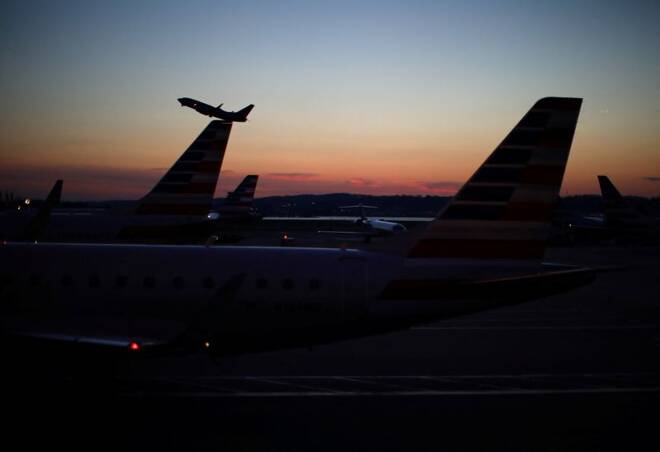Advertisement
Advertisement
U.S. airlines warn 5G wireless could wreak havoc with flights
By:
WASHINGTON (Reuters) - Major U.S. air carriers on Wednesday warned that AT&T and Verizon's planned use of spectrum for 5G wireless services could be highly disruptive to U.S. air travel and cost air passengers $1.6 billion annually in delays.
By David Shepardson
WASHINGTON (Reuters) -Major U.S. air carriers warned on Wednesday that plans by wireless carriers to use spectrum for 5G wireless services starting Jan. 5 could disrupt thousands of daily flights and cost air passengers $1.6 billion annually in delays.
AT&T and Verizon Communications must delay the plans to use C-Band spectrum for 5G wireless services, United Airlines Chief Executive Scott Kirby said following a U.S. Senate Commerce Committee hearing, saying it could delay, divert or cancel about 4% of daily flights and impact hundreds of thousands of passengers.
“It would be a catastrophic failure of government,” Kirby told reporters.
The aviation industry and the Federal Aviation Administration (FAA) have raised concerns about potential interference of 5G with sensitive aircraft electronics like radio altimeters
Last week, the FAA issued new airworthiness directives warning that interference from 5G wireless spectrum could result in flight diversions, but did not quantify the impact.
“Coming Jan. 5 — unless something changes — we will not be able to use radio altimeters at 40-something of the largest airports in the country,” Kirby said. “It is a certainty. This is not a debate.”
Kirby said it would mean that at major U.S. airports in the event of bad weather, cloud cover or even heavy smog “you could only do visual approaches essentially.”
Trade group Airlines for America (A4A) said Wednesday that if the FAA 5G directive had been in effect in 2019, “approximately 345,000 passenger flights, 32 million passengers, and 5,400 cargo flights would have been impacted in the form of delayed flights, diversions, or cancellations.”
Southwest Airlines’ chief executive, Gary Kelly, told the Senate hearing that if the FAA directive takes effect it “would be a significant setback” to its operations.
The wireless industry defended the technology.
“The aviation industry’s fearmongering relies on completely discredited information and deliberate distortions of fact,” CTIA, a wireless trade group, said.
It said that 5G operates safely and without causing harmful interference to aviation operations in nearly 40 countries around the world.
The Biden administration is eager to see the issue resolved. White House National Economic Council director Brian Deese met with Federal Communications Commission Chair Jessica Rosenworcel and Transportation Secretary Pete Buttigieg on the issue Wednesday, sources told Reuters. The White House and the Transportation Department did not comment.
Republican Senator Marsha Blackburn at the hearing urged airlines to work with the wireless carriers to reach agreement.
Rosenworcel, who did not comment Wednesday, has said she believes the issues can be resolved and spectrum safely used.
In addition to agreeing to delay the commercial launch of C-band wireless service until Jan. 5, AT&T and Verizon in November adopted precautionary measures for six months to limit interference.
Aviation industry groups said they were insufficient to address air safety concerns and have made a counterproposal.
United’s Kirby said the FCC and FAA “need to get in a room and talk to each other and solve the problem,” adding that the issue “cannot be solved on the back of airlines.”
A4A said the FAA directive would “materially disrupt airline operations” and said cargo operators estimate it “would have cost them $400 million annually.”
The group said “the annual impact cost to passengers to be approximately $1.59 billion” of travel delays.
Wireless carriers have shown no interest in further delays to using the spectrum, which the industry paid more than $80 billion to acquire.
The FAA directives order revising airplane and helicopter flight manuals to prohibit some operations requiring radio altimeter data when in the presence of 5G C-Band wireless broadband signals.
The FAA plans to issue further notices to airlines before Jan. 5 offering more detail on the potential interference and is in discussion about which altimeters could be used under the current mitigation plans.
(Reporting by David Shepardson; Editing by David Gregorio and Leslie Adler)
About the Author
Reuterscontributor
Reuters, the news and media division of Thomson Reuters, is the world’s largest international multimedia news provider reaching more than one billion people every day. Reuters provides trusted business, financial, national, and international news to professionals via Thomson Reuters desktops, the world's media organizations, and directly to consumers at Reuters.com and via Reuters TV. Learn more about Thomson Reuters products:
Did you find this article useful?
Latest news and analysis
Advertisement
